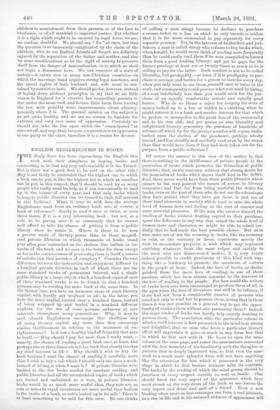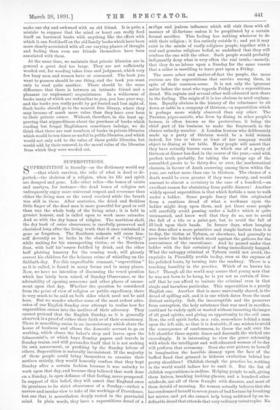ENGLISH NIGGARDLINESS IN BOOKS.
THE Daily News has been reproaching the English this
week with their stinginess in buying books, and contrasting us in that way very unfavourably with the French. But is there not a good deal to be said on the other side ? May it not fairly be contended that the highest use to which a book can be put, is like the highest use to which an omnibus can be put, in this respect, that it should be used by as many people who really want its help as it can conveniently be used by in the course of every year, and that only books which belong to public libraries can be turned to their full account in this fashion ? What, it may be said, does the average Englishman want from an ordinary book, not, of course, a book of reference? Surely to read it once or twice, or even three times, if it is a very interesting book ; but not, as a rule, to be poring over it so constantly that he cannot well afford to take his chance of getting it from a public library when he wants it. Where is there to be seen a greater waste of literary power than in those magnifi- cent private libraries in which thousands of books stand year after year untouched on the shelves, like bullion in the vaults of the bank, and no man is, the better for them except so far as the consciousness of possessing them is itself a source of satisfaction that partakes of vainglory ? Consider the vast difference between the instruction and enjoyment diffused by a hundred private libraries, in each of which there are the same standard works of permanent interest, and a single public library in a large city in which a hundred copies of each of those standard works is to be found, so that a hundred persons may be reading the same book at the same time. In the former case, you have an immense store of sunk literary capital, with hardly any usufruct at all; in the latter, you have the same capital, turned over a hundred times, instead of being wrapped up and buried in a hundred different napkins, for the use of some persons unknown at rare intervals throughout many generations. Why, it may be said, should Englishmen encourage this thriftless way of using literary capital, any more than they encourage similar thriftlessness in relation to the mammon of un- righteousness P Is it not a healthy kind of frugality that says to itself :—` Why should I pay for more than I really want,— namely, the chance of reading a good book once at least, and perhaps two or three times when it is a book that closely touches my chief interest in life ? Why should I wish to buy the book because I want the chance of reading it carefully, more than I wish to buy a cab which I should only use once a week, instead of hiring it when I want it P If private libraries were limited to the few books needed for constant reading, and public libraries had all the accumulated copies of books which are buried and embalmed, as it were, in private libraries, books would be as much more useful than they now are, as coin or notes in rapid circulation are More useful than bullion in the vaults of a bank, or notes locked up in. its safe.' There is at least something to be said for this view. No one thinks of calling a man stingy because he declines to purchase a season-ticket on a line on which he only travels so seldom that it is far more economical to pay separately for every separate journey. Yet, in the interest of booksellers and pub- lishers, a man is called stingy who refuses to buy books which, when bought, he would never think of reading more frequently than he could easily read them if he were compelled to borrow them from a good lending library ; and yet he pays for the former privilege at least ten or twenty times as much as he is willing to pay for the latter. Such conduct is not to be called liberality, but prodigality,—at least, if it is prodigality to pur- chase a carriage and horses for a groom to exercise every day, when you only want to use them yourself once or twice in the week, and consequently could procure what you need by hiring, at a cost indefinitely- less than you would need for the pur- chase of an equally comfortable vehicle and equally good horses. Why do we blame a miser for keeping his store of money locked up in a box or hidden in a stocking, when he might entrust it to a bank and receive interest for that which he prefers to monopolise to the great loss of the community and to his own risk, and yet praise as wise liberality and enlightened literary generosity the purchase of hundreds of volumes of which by far the greater number will repose undis- turbed upon the shelves of the purchaser, perhaps wholly unread, and less steadily and carefully read even by the owner than they would have been if they had been taken out for the purpose from a public collection ?
Of course the answer to this view of the matter is, that there is nothing in the indifference of private people to the possession of books which promotes the formation of public libraries ; that, on the contrary, without-that strong desire for the possession of books which shows itself first in the indivi- dual, there never would have been those public libraries which ensure to the very poorest the means of access to literary treasures ; and that, far from being wasteful, the desire for books, even on the part of those who do not use the advantages they have gained after they have got them, is just one of those ideal elements in society which tend to raise the whole level of human taste and feeling at the cost of coarser and more material pleasures. If the man who secures himself the reading of books without wasting capital in their purchase, spent the difference in any way that raised the whole level of human taste and character, we might be able to admit cor- dially that he had made the best possible choice. But as in nine cases out of ten the economy in books, like the economy in cabs, or the economy in dress, represents merely the wish to accumulate property, a wish which may represent anything whatever, from the most vulgar and earthly to the most wise and disinterested motive, it is very rarely indeed possible to credit parsimony of this kind with any- thing like a tendency to promote the maximum of culture in the people at large. Indeed, the love of books, as distin- guished from the mere love of reading, is one of those passions which has been almost essential to the increase of the love of reading in the people. For how could the writers of books have ever been encouraged to produce them at all, in the ages when the love of literature was still in its infancy, if there had not been a considerable number of persons who cared not only to read but to possess them, seeing that in those times it was not possible in a general way to get the oppor- tunity of reading them without also possessing them 11 Indeed, the eager reader of books can hardly help eagerly desiring to possess them. The association with the partiesalar volume in which a vivid interest is first presented to the mind is so strong and delightful, that no man who loves a particular literary effect will appreciate it quite so much in any form but that in which he first met with it. He loves to open the same volume at the same page, and renew the asselciations connected with the first moments of his familiarity with the thoughts or pictures that so deeply impressed him, so that even the same work in a much more splendid form will not have anything like the attraction for him which it possessed in the very shape in which he first became intimate with its contents. The books by the reading of which the mind grows, should be familiars in every respect, outside as well as inside. One should know the very aspect of the sentences which have most struck us, the very dress of the book, as one knows the
gait of a friend. Even a new very aspect and dress and binding often more or less estranges one from a real intimate, as a rise in life and in his outward richness of appearance will make one shy and awkward with an old friend. It is quite a mistake to suppose that the mind or heart can eeally feed itself on borrowed books with anything like the effect with which it can feed itself on the old family books which have been more closely associated with all our varying phases of thought and feeling than even our friends themselves have been :associated with them.
At the same time, we maintain that private libraries are in :general a great deal too large. They are not sufficiently weeded out, for weeding takes time and judgment, which very few busy men and women have at command. The book you want to possess should be one thing, and the book you want only to read quite another. There should be the same slifference that there is between an intimate friend and a pleasant (or unpleasant) acquaintance. In a wilderness of books many of which are unfamiliar to you, you lose your way, and the books you really profit by get buried and lost sight of. such books should go to the nearest free library, where they may become of much more value than they have ever been to their private owner. Without, therefore, in the least ap- proving that niggardliness about the purchase of books which reading but frugal Englishmen sometimes indulge, we do 'think that there are vast numbers of books in private libraries which would be ten times as useful in public libraries, and which would not only add to the value of those public libraries, but would add, by their removal, to the moral value of the libraries from which they were weeded out.



































 Previous page
Previous page